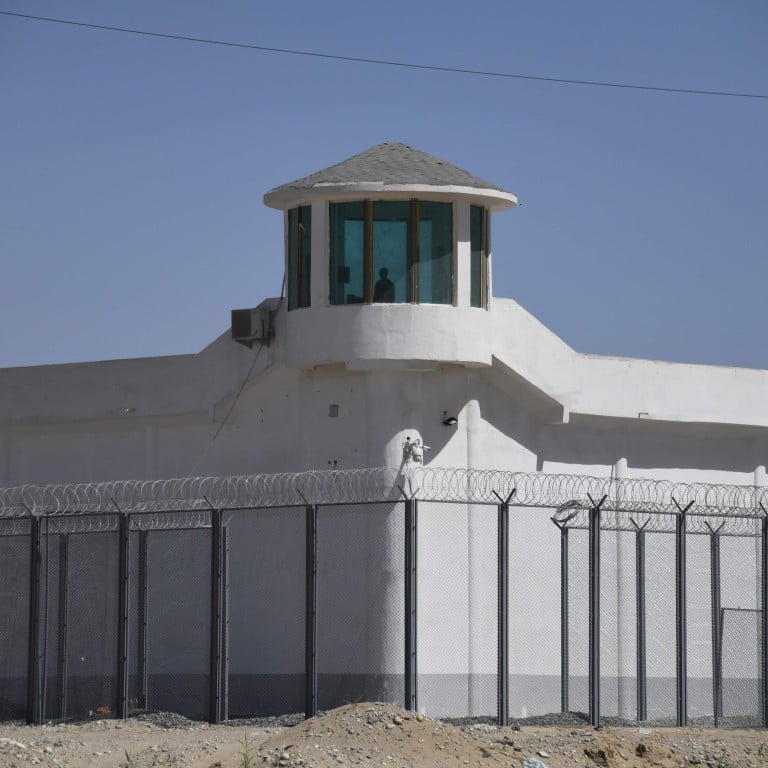
China claims ‘success at this stage’ of Xinjiang internment camps amid global outcry
- Third white paper in five months on controversial policies in the region says there have been no terror attacks for three years as a result of programme
- It also repeats claim that ‘most’ people have been released after completing training, without giving numbers, in latest response to international criticism
The government’s defence comes amid a growing international outcry over the network of internment camps, where United Nations experts have said more than 1 million ethnic Uygurs and other Muslim minorities were being held for political indoctrination. Former detainees have said they were subjected to abuse and torture at the camps.
Thought police create climate of fear in tense Xinjiang region
In the document published on Friday, titled “Vocational education and training in Xinjiang”, the central government press office said the region had seen no terrorist attacks in the past three years as a result of the programme.
“We have achieved significant success at this stage – the measures used in Xinjiang should warrant respect and understanding from the international community,” the white paper said.
The State Council Information Office has issued two other white papers, in March and July, on terrorism and historical issues in Xinjiang as part of its propaganda campaign aimed at justifying its hardline policies.
According to the latest white paper, the programme had effectively put a stop to extremism and improved social stability as well as trainees’ job skills.
China-born opponent of Xinjiang crackdown goes on trial in Kazakhstan
The paper also denied that anyone had been tortured, and it maintained trainees could still speak in their mother tongue, practice their religious faith outside the facilities, receive letters and go home on a regular basis.
It said the facilities were “education and training institutions” that operated within the law to train people who had displayed extremist thoughts and been involved in acts of terrorism.
Classes included Chinese language, Chinese law and vocational skills to boost employment.
But the white paper did concede there was “room for improvement” in the region’s programme, without elaborating.
Observers saw the white paper as the latest response from Beijing to an “unprecedented wave” of criticism from abroad.
A Guangdong-based academic who specialises in Xinjiang terrorism issues agreed that the internment camps had been a “success at this stage”.
“But no one can promise there won’t be a return to terrorism – my concern is that it might come back even stronger than before the vocational camps were set up [in early 2017],” said the academic, who declined to be named due to the sensitivity of the subject.
Uygur who fled Xinjiang still monitored by Chinese authorities in New Zealand
We also don’t understand why there are so many non-radicalised citizens being admitted. What is the definition and standard for the so-called terrorism and Islamist extremism?
The academic expected a relaxation in the internment programme to address criticism from the international community, but he said it was unlikely Beijing would put an end to the camps because it was still worried about terrorism in the region.
“This is the third white paper on Xinjiang issues in just five months. This is unprecedented and it really shows China is facing mounting international pressure over Xinjiang,” he said. “The obvious thing to do is to reduce the amount of ammunition the West has against [China].”
Open discussion of the policies in Xinjiang remains taboo in China, while many academics studying in the region have not been allowed to conduct independent research on the facilities. Beijing has yet to give any indication as to how many people have been held in the camps, and for how long.
Shih Chien-Yu, executive secretary of the Taiwan Central Asian Research Association and a senior lecturer at Chu Hai College of Higher Education in Hong Kong, said the white paper aimed to show “what Beijing is doing” as the US Congress prepared to table the Uygur Human Rights Policy Act.
Trump hears ‘tough’ Xinjiang camp details from detained Tohti’s daughter
The bill would empower the State Department, FBI and other law enforcement agencies to hold accountable Chinese officials who intimidate Uygurs overseas.
“This will step up pressure on China and it could also result in sanctions,” Shih said.
He noted that the white paper failed to explain why there were so many elderly people, intellectuals and professionals receiving the vocational, Chinese language and legal training.
“We also don’t understand why there are so many non-radicalised citizens being admitted. What is the definition and standard for the so-called terrorism and Islamist extremism?” Shih said.

